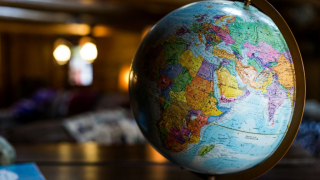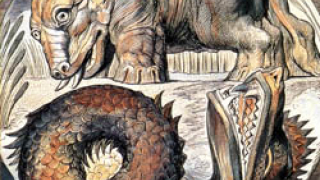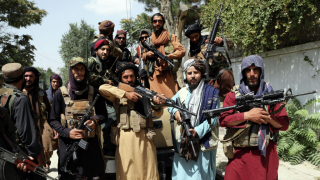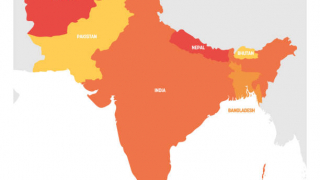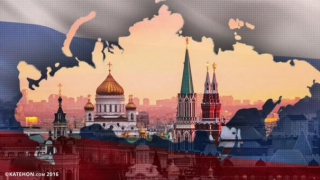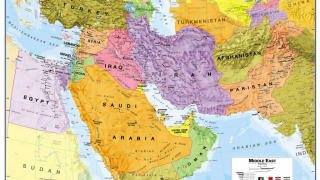Pakistan's elections: Turning over a new leaf
14.05.2013
Pakistan's elections come at a key junction in the region's geopolitics, with the public firmly opposed to the US 'war on terror' being conducted on Pakistani soil with no regard for its sovereignty. Pakistan’s new prime minister has a mandate to take his country in a new direction, but will he use it?
Steel magnate Nawaz Sharif is the country's fourth wealthiest citizen, a protege of General Zia ul-Haq, toppled in a 1999 military coup, sentence to life imprisonment and exiled to Saudi Arabia. His Muslim League (PML-N) has enough seats to avoid the need for a coalition with second-place former cricketer Imran Khan’s Tehrik-i-Insaf (PTI), and/or the Bhutto family’s Pakistan People’s Party (PPP), which until last week presided over Pakistan’s first full-term civilian government. Despite pre-poll violence that killed at least 40 people, voter turnout was a robust 60%.
On the surface, a win-win for Sharif, Khan, Pakistan, and even the West, which very much needs a stable government there. But Sharif, prime minister for the third time (having served from 1990–1993 and 1997–1999), has loads of baggage: his love of neoliberal trickle-down economics, his close ties with Saudi Arabia, his abiding interest in closer links with Central Asia republics (echoes of past regimes’ regional hegemonic designs). And though he loudly supported the reinstatement of Chief Justice Iftikhar Chaudry (dismissed by Pervez Musharraf in 2007), he is no stranger to intimidating judges, having ousted Supreme Court chief justice Sajjad Ali Shah in 1997. He notoriously ‘pressed the button’ to bring Pakistan into the nuclear age in 1998. And he was best friends with the military until he was 'betrayed' by his own 1998 appointee as army chief of staff, Pervez Musharraf.
What do the tea leaves tell us? Well, for one thing, ex-General Musharraf, who hounded Sharif into exile, better put a strong lock on his home near Islamabad, where he is now under house arrest. And Pakistanis better brace themselves for IMF-style austerity. US strategists also should be prepared for a continuation of the cooling of relations. Sharif’s brother Shahbaz, chief minister of Punjab, has stopped all USAID projects in Punjab province as a protest against Washington’s use of drones (3,000 dead since 2004), though we can be sure Nawaz is unlikely to jeopardise the $2 billion in annual US ‘aid’.
Speaking of Nawaz’s brother, his son Hamza is a member of the National Assembly. And Nawaz’s daughter Maryam is leader of the PML-N. And, and … Politics is a family affair in Pakistan, though as the falling-out and scandals of the various Bhuttos (and Sharif’s cold-blooded alliance with Benazir’s brother Murtaza) suggests, the families are not always happy. So much for “cleaning up corruption”.
Is there any hope for a new direction? Well, Sharif considers himself a friend of the environment, a fan of “bioconservatism”, having established the Environmental Protection Agency in 1997. He is committed to Islamization, including a more sharia-based legal system, though there is little to suggest that social justice plays any role at all in his deen. He may actually try to patch up relations with India; he tried to with the Lahore declaration in 1999 until undermined by clashes in Kargil, Kashmir.
But don’t hold your breath waiting for any surprises. Sharif is in fact a logical heir to Pakistan’s tragic history, which continues to unfold, regardless of who sits on top. Since partition in 1947, intended by the British to leave a prostrate subcontinent which would be beholden to empire, Pakistani politics has been mostly dominated by military rule and crises. This makes sense, as Pakistan’s Muslims are a highly pluralist mix of Sunni and Shia, with large communities of Ahmadi, Bahai and others, and tension often boil over, requiring a firm, neutral hand.
But then Pakistan is not so different from other majority-Muslim states, which all share a history of authoritarian, top-down forced adoption to western modernity, characterized by accepting an imposed economic system of capitalism and a political system composed of ‘sovereign’ ethnically distinct nation states. The entire Muslim world was subjected to this in some form, be it by a monarch, a military dictator, a colonial administration or a neocolonial ‘independent’ administration. This includes Turkey, Egypt, Syria, Jordan, Morocco, Iran, Indonesia and Malaysia, with Saudi Arabia and the Gulf states the ‘exceptions that prove the rule’.
Pakistan and Turkey have striking similarities. Both Pakistan and Turkey’s military staged coups from the 1950s to the 1980s to stop moves towards promoting more religious practice, though the coup in Pakistan in 1977 and in Turkey in 1980 changed the nature of the ‘game’, as the US began to openly embrace so-called mujahideen across the Muslim world as its Cold War ace against the Soviet Union.
Pakistan’s colonial nightmare differs from Egypt’s at the time of ‘independence’ after WWII. Pakistan’s partition and ethnic/ sectarian tensions among uprooted peoples did not allow the formation of a Muslim Brotherhood-type organization which could unite the country around a program of Islamic social justice. Egypt’s military coup of 1952 was necessary to pre-empt the Muslim Brotherhood, which would have been the clear winner in any elections. Unlike Pakistani and Turkish military strongmen, Egypt’s populist Gamel Abdel-Nasser was as a result prompted to follow a socialist anti-imperialist path to independence, and became the toast of the Muslim world—until US-Israeli hegemony was asserted in the region in 1967, humiliating the hero of Arab nationalism and undoing fatally this secular socialist path.
On the surface, the imperial strategy of creating a weak, divided Indian subcontinent largely worked. India’s experiment with socialism was mild, and only Pakistan’s Zulfikar Bhutto flirted briefly with socialism and anti-imperialism in the 1970s—and was rewarded by being hanged (by Sharif’s patron Zia ul-Haq). With the demise of the Soviet Union, the empire consolidated its hold on both India and Pakistan, letting them continue their spat over Kashmir, a senseless and massive drain on both the Indian and Pakistani budgets, but excellent divide-and-conquer geopolitics for the US. The socialist ‘threat’ was wiped out in the horrendous ‘jihad’ in Afghanistan, which unleashed al-Qaeda types on the world.
As a result, when Sharif grabbed the reins of power in the 1990s, he found he was riding a tiger. The Taliban were the real thing, so to speak: unlike craven Pakistani politicians, they wanted to attack the very empire itself. Pakistan’s relations with the US deteriorated and have continued to deteriorate ever since as various leaders try unsuccessfully to square the circle, encouraging the Taliban and pacifying the Americans.
A new leaf for Pakistan will probably not be the work of Sharif. Rather, the logic of regional developments will continue to assert itself. The PPP government was forced by popular pressure to cut off the NATO supply route to Afghanistan and to restrict US military activity. At the same time, it increased military and economic cooperation with China and Iran. Sharif’s PML-N will continue this. US policy is pushing its once subservient ally into the hands of its ‘enemies’.
The best than can be hoped for in Pakistan is that a (slightly less) corrupt Sharif will patch up relations with India, which the army can do little to stop, given the failed state that Pakistan finds itself in. This means ending demands to tear Kashmir away from India, and abandoning the Taliban. A return of the Taliban may be what some hardliners are rooting for, but given the unwillingness of any of the major players—in the first place India, Russia, Iran, China and of course the US—to allow this, Sharif has a stronger hand this time, if he’s sensible enough to play it, for peace with India can only come by letting go of Afghanistan.
If Sharif can strike a peace accord with India and work with regional players—including Iran— and the US in Afghanistan, peace will break out in the region. This would reopen the borders with India, creating an economic boom across the region. At the same time, it will accelerate a genuine withdrawal of US forces from the region, end its threats to invade Iran, and—please note, US strategists—the US would still have quite a bit of influence in post-pullout Afghanistan. In fact, its profile across the region would be transformed for the better.
This would also dash Pakistan’s goal of becoming regional hegemon. But peace with both Afghanistan and India would be a win-win for it too, slashing the parasitical military and raising living standards through mutually profitable cooperation with India, Iran and China. The centerpiece will be the Iran-Pakistan-India (IPI) Peace Pipeline. Even if Pakistani politics remains corrupt (and it will), the new regional cooperation would give a huge boost to its economy.
If Sharif has the courage to do this, it would start the difficult process of turning over a new leaf for Pakistan. It would also guarantee him a second term, which combined with his peaceful accession to power, would mean a gratifying political bookend for his rule, making him ‘independent’ Pakistan’s true founder.


